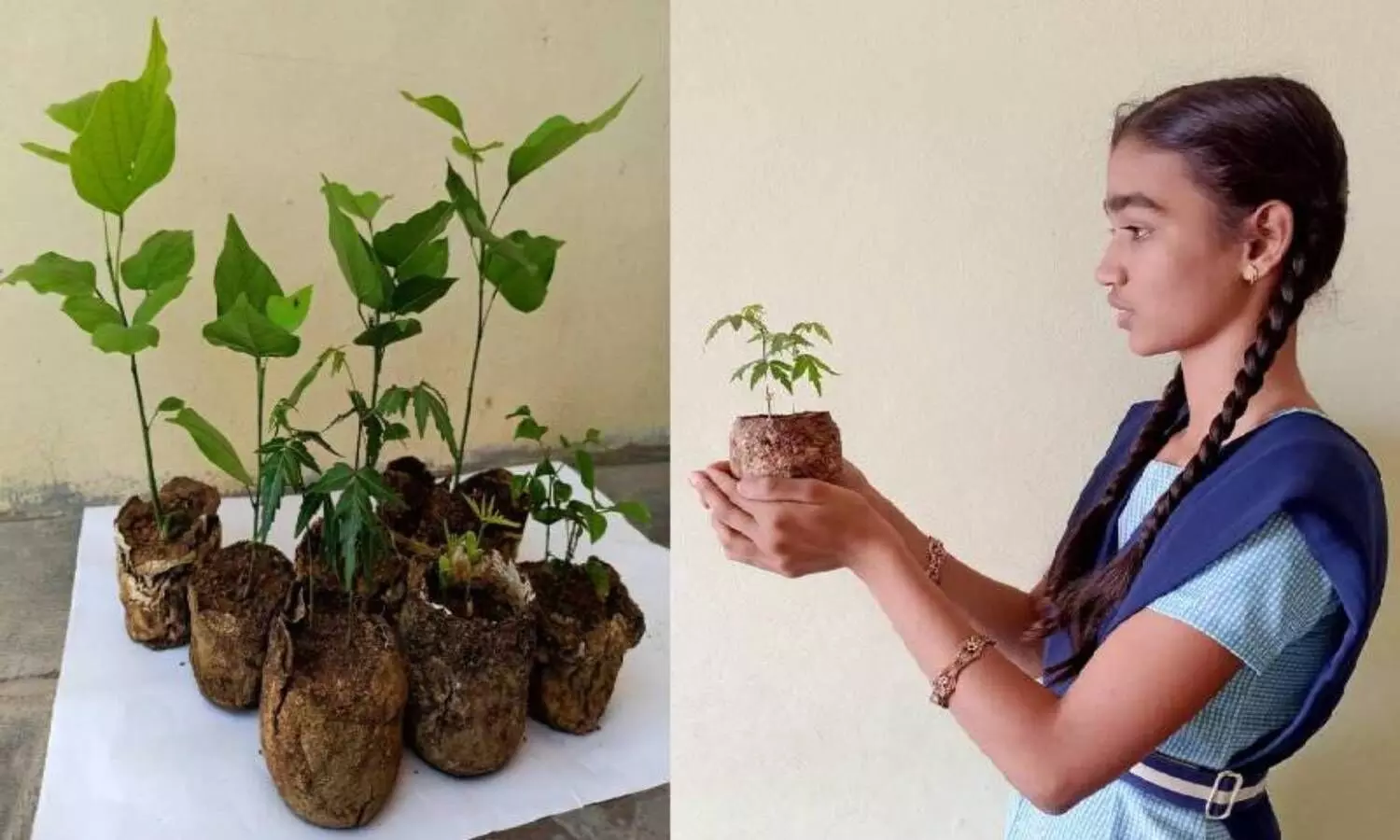`Dreams Unlimited': T-Works, GE Appliances to adopt ZPHS students' innovation, manufacture eco-friendly bio-pots
Class X student A. Srija and Class IX student K. Hari Krishna of Zilla Parishad High School (ZPHS) Chintalkunta, made eco-friendly and biodegradable pots from groundnut shells.
By Sumit Jha
Hyderabad: T-Works and GE Appliances on Friday announced to adopt a grassroots invention and manufacture eco-friendly bio-pots for a sustainable environment.
Class X student A. Srija and Class IX student K. Hari Krishna of Zilla Parishad High School (ZPHS) Chintalkunta, made eco-friendly and biodegradable pots from groundnut shells.
T-Works and @GE_Appliances collaborated to set up a small scale domestic industry for biopot production in Gadwal district, Telangana. The teams, along with @teamTSIC & Srija, did a live demo of making the biodegradable pots.@KTRTRS @MinisterKTR @jayesh_ranjan @KarampuriSujai pic.twitter.com/qmTPzyQXO2
— T Works (@TWorksHyd) November 19, 2021
The idea to make the bio-degradable pot started on March 19, 2020, when Srija was digging a pit in school premises to plant a sapling. She found a polythene bag from a sapling that was planted a few years ago. She observed that the sapling had been planted along with the polythene bag.
T-Works, a government of Telangana initiative, and GE Appliances, owned by the Haier Group Corporation, have decided to formal shape and manufacture bio-pots.
"I got to know that many people plant the saplings along with the polythene bag. If they remove the cover, the soil around the roots will become loose and the plant will not survive. I found many polythene bags on my school premises. I also observed the wastage of polythene bags in nurseries," Srija told NewsMeter.
After careful thought, she came up with the idea of a biodegradable pot made from groundnut shells. She started working on the proposal along with her schoolmate K. Harikrishna, then a student of Class VIII.
"Polythene bags are used in nurseries. These are single-use plastic which is harmful to the environment as it is non-degradable. These polythene bags gradually break down into smaller microplastic which contaminates our soil and water. They are also transmitted to animal tissue, and finally enter the human food chain," Srija said.
She said polythene bags create a mammoth problem. "They are conventionally used for large-scale seedling production in nurseries. These methods are practiced all over the world and are very harmful to the environment. The polythene bags used in nurseries cannot be recycled. If they remove the polythene bag, there is no process of collecting them," she said.
She said plastic also poses problems for the seeds. It causes root coiling, less fibrous root formation, poor aeration, and poor seedling growth.
During her research, Srija found that polythene bags are being used for plants despite the directives of the union ministry of forest and environment.
Srija and her team decided to make biodegradable pots from groundnut shells to provide nurseries with an alternative. "Farmers usually burn or bury groundnut shells. They also have a slow degradation rate under natural conditions but are rich in many functional compounds and are composed of cellulose, hemicellulose, and lignin," she said.
P. Augustine, the school assistant from Zilla Parishad High School (ZPHS), told NewsMeter, "There are several advantages of groundnut shell pots. They break down naturally in the soil in a week and have some great benefits like they can hold moisture in the soil for a long time, require less water, and are very environment friendly. The survival rate of a plant is more when planted in these pots and they also do not cause land pollution."
He said groundnut shell is a wonderful source of Nitrogen, phosphorus, and calcium and it acts as an organic manure for the plants, providing macronutrients as well as micronutrients.
"We aim to motivate farmers to supply groundnut shells to manufacture bio-degradable pots instead of burning them. We aim to replace conventional polythene bags with our bio-degradable pots and reduce plastic usage by around two million tonnes every year throughout India," he said.
For their innovation, Srija and Hari Krishna won third prize at the CSIR Innovation Award for School Children, 2020. Knowing about her innovation, T-works, India's largest prototyping center in Hyderabad, invited her to showcase innovation.
"T-works took our idea. Though we are from a small school in Telangana, they had belief in us. I shared my idea with them and now, they are trying to develop a machine through which production could be taken up on a large scale," said Srija gleefully.
The event involved a live demonstration with plant and machinery where volunteers from GE Appliances received hands-on experience in manufacturing biodegradable pots.
T-Works designed and developed the custom-built machine, the bio press as part of its rural development program to enable mass manufacturing of biodegradable pots,
"Today is an important day in the journey of our Rural Innovation Development Program. After developing a mechanism to mass-produce Srija's bio pots, we are now moving a step closer to setting up an industry based on this idea. This is why T-Works exist. An innovative idea is evolving into the employment-generating manufacturing industry," said Sujai Karampuri, CEO, T-Works.